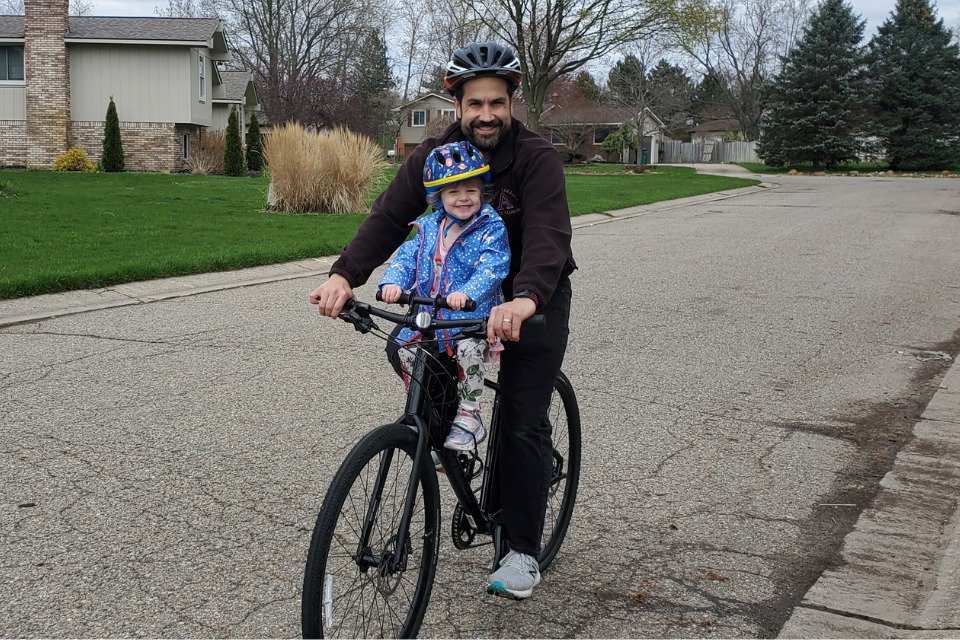As Rev. Joel Walther settles into his new role as Director of Conference Benefits and Coordinator of Human Resources, he announces some important news and chats about his journey from pastoral ministry and his hopes for the future of conference benefits.
On August 1, 2023, Rev. Joel Walther began his new role as the Michigan Conference’s Director of Conference Benefits and Coordinator of Human Resources.
In his first interview with MIconnect, Joel spoke to communications staff about how congregational ministry has prepared him for this new career path. He talked candidly about the pressing challenges facing clergy and staff regarding healthcare benefits and pensions and brainstormed some possible solutions the Benefits Office could help with moving forward.
Walther also shared the news of a new monthly benefits newsletter — For Your Benefit — that begins this month, along with a reminder about benefits open enrollment, which begins next Monday, November 13. It will run for two weeks, ending on Monday, November 27.
The Director of Conference Benefits and Coordinator of Human Resources oversees all benefits related to annual conference clergy, conference staff, and employees of related agencies. This includes pension plans, welfare plans (disability and death), healthcare plans, and payroll. In the Benefits Office, Walther works alongside Jennifer Gertz, Executive Assistant to the Benefits Office, and John Kosten, Benefits Coordinator, in the day-to-day responsibilities.
Learn more about the Benefits Office and access a host of benefits and pension resources via the Benefits Toolbox on the Michigan Conference’s website. Please contact Joel at jwalther@michiganumc.org with any questions.
First, tell us about the new benefits newsletter launching this month and how it dovetails with open enrollment, which begins next week.
We’re excited to release a new monthly benefits newsletter called For Your Benefit. Through it, we plan to explain various benefits so people know how to use them. We want to get benefits information out to people more frequently. I continue to hear that people don’t know what their benefits are. I want to change that by communicating more and more.
For Your Benefit will be simple and digestible, including a main article and a sidebar called MIbenefits Guy, where I will write about another topic, sometimes related, sometimes equally timely. In upcoming months, I will share about the Virgin Pulse walking/health program, Teledoc, our EAP (Employee Assistance Program), the value of contributing to your United Methodist Personal Investment Plan (UMPIP), EY financial planning resources, and more.
The main article in this month’s For Your Benefit will be focused on the benefits open enrollment period, which is set for November 13-27, 2023. Participants will be receiving e-mails and mailings with specific instructions soon. If you miss an instruction or want to verify you have all the available information, visit our web page.
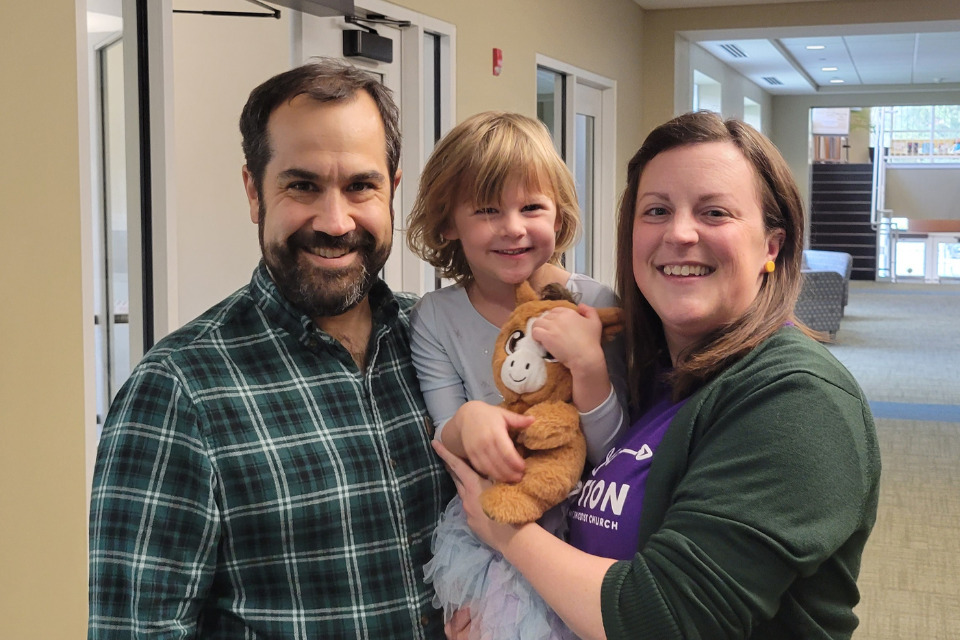
Walk us through your journey from Minnesota to Michigan, and tell us about your family.
I’m originally from Minnesota, and I’m the child of a United Methodist pastor. My dad is a retired elder in the Minnesota Conference. I felt a call to ministry in my teenage years and later went to Wesley Theological Seminary in Washington, D.C., where I met my wife, Megan. She grew up in Canton, just west of Detroit, and that’s what led me to Michigan from Minnesota.
We took our first appointments in 2011 in southeast Michigan, in Monroe County. I was at LaSalle: Zion UMC and Petersburg UMC down there, and Megan served at Erie UMC. We pastored those churches for six years and then moved to Clarkston in 2017. Megan is the associate pastor at Clarkston, and I served at Goodrich, about 16 miles north of Clarkston on M-15, until this summer. We have one daughter, Maxine, and a pug named Fern.
God called you to pastoral ministry, so explain how you will be utilizing those same gifts in a different context.
A lot of people have great stories about times when Don Emmert, who was in this position for nearly 30 years, was there for them during family health crises or when applying for disability. He was more hands-on than some directors of benefits in other conferences, where it’s mostly an administrative job, and that’s what conference leadership wanted to continue. Like me, Don came out of the local church and had to learn about benefits and human resources when he first started, and he brought a pastor’s heart to the job. That’s where my heart is also. I really care about pastors. That’s just been the nature of my life. My dad is a pastor, and my wife is a pastor, and I love them both. Plus, I’m a pastor myself. I am glad to take on this new role to see the best for clergy and their families in our conference, as they are active and getting benefits, and then retire and receive pensions and health insurance.
I also keep thinking about the word “benefits,” which is about doing your best for someone. It comes from the Latin for “good deeds,” so my goal is to think of how we can do the most good that we can. There’s that famous misquote of John Wesley, which most people know wasn’t his, but we still love the quote — “Do all the good you can, by all the means you can . . .” — because it is a truly Wesleyan sentiment even if he didn’t actually say it. And so, I think I come to this work, saying, what is the good I can do for clergy because I care?
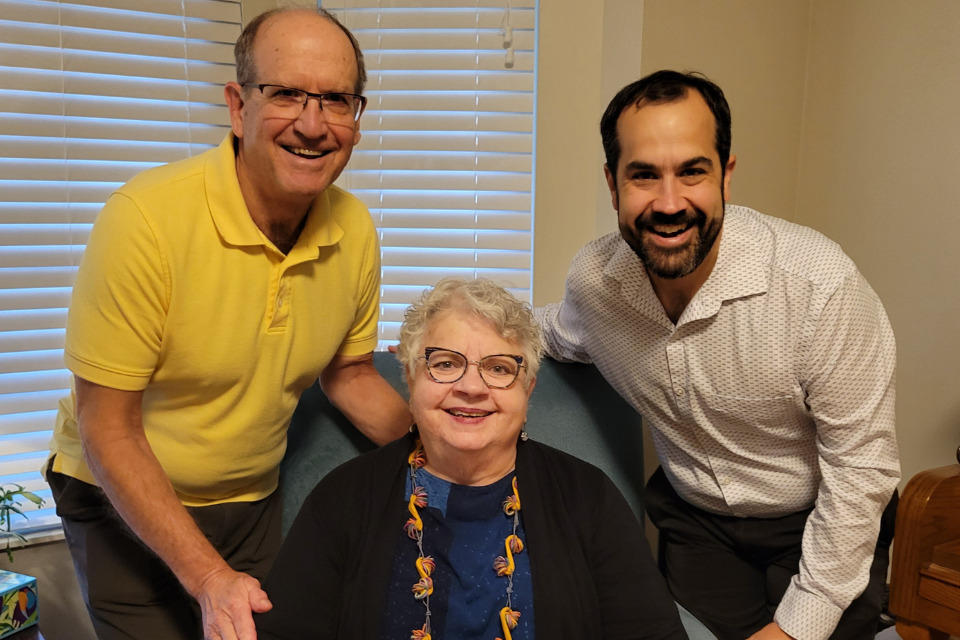
Describe other skills and expertise you bring to this position.
One of the things about me is that I love to tinker and understand things. I’ve always been a bit of a tech guy, curious about taking computers apart and figuring out how they work. And this is part of what I bring to this job: the need to deeply understand human resources, benefits, and health insurance and then trace all the intersections. There are the pension programs, legal IRS requirements, and disciplinary requirements because of The United Methodist Church. And it’s quite complex. So, I am excited to be in it because I love to keep digging down to look at things and then communicate it all clearly to others.
I’m hoping that part of my administrative work as a human resources coordinator can be to be more proactive in communications, reminding people of their benefits and how to use them. When I started this position, one of the things that I heard repeatedly from colleagues was that they didn’t know all the benefits they had available to them. So, that is one of the primary reasons we wanted to start this monthly benefits newsletter, For Your Benefit. We want to get information out and repeat it over and over. I keep telling people I have a four-year-old daughter right now, so I’m uniquely positioned to do this work because I’m used to not getting tired of repeating myself.
Here’s one example to illustrate this communications need. How many know that we have an Employee Assistance Program (EAP)? It’ll offer you five free counseling sessions about any topic. I had no idea this was available to me when I started. About a year and a half ago, we lost a daughter at 22 weeks. Eventually, I needed grief counseling and was able to get it because our healthcare covers that as well. But when I started here three months ago, I discovered I could have gotten five free sessions through the EAP to help me navigate those early steps. Instead, I floundered for a while because I didn’t know where or how to look for a counselor.
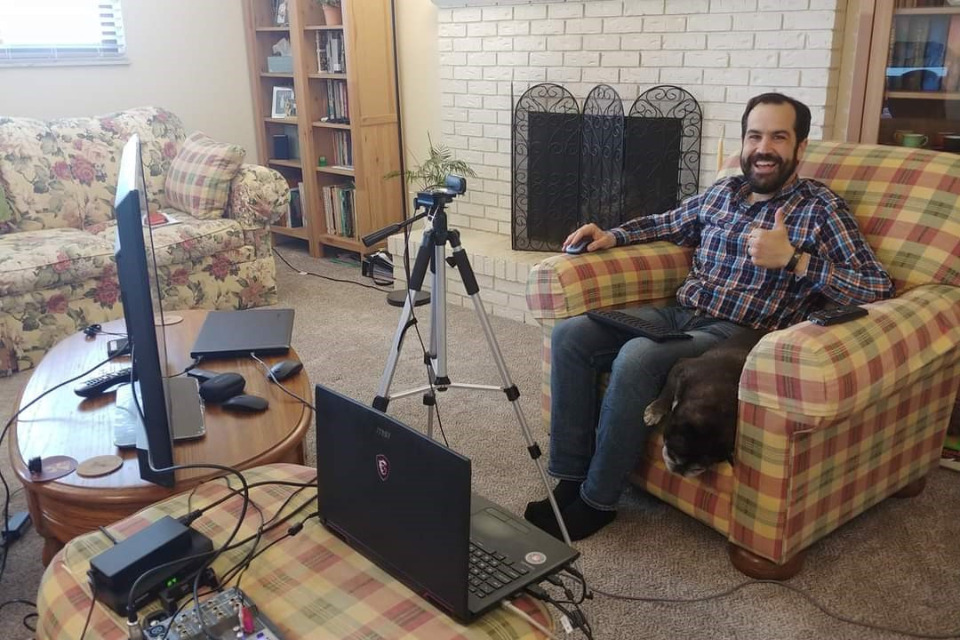
What are some of the most pressing challenges clergy and staff face regarding healthcare benefits or pensions today?
First of all, we are currently in a position where we are well-funded for covering the current healthcare needs and future pensions that we are aware of. Of course, there are limitations and challenges. Fewer churches will be paying into our programs. There are rising healthcare costs, plus our clergy’s aging population. The economy can change, and we may find that we don’t have enough money to cover future pensions. It’s the terrible actuarial game that we always play. Still, we are in a pretty good position, so I wonder if there are ways we can carefully and intelligently use funds to do more to support our clergy.
One of the challenges we must continue to focus on is our pastors’ mental health and well-being. The COVID-19 pandemic laid bare some of the things we tended to gloss over in our churches, whether we’re talking about our political differences or whatever. And then you have the tensions of the current season of disaffiliation in The United Methodist Church. All of that has taken its toll on the mental health of our pastors and church leaders.
One practical thing we can do immediately is to remind clergy about the five free counseling sessions through our EAP that are available to them if they are struggling with any issue. Then, additional mental health resources are available through our health insurance plans.
The other thing we could do as a conference that tends not to happen, mainly for financial reasons, is that clergy are technically entitled to a renewal leave, according to the Discipline. I’ll admit, I’ve been in ministry for 12 years and never taken a renewal leave. So, honestly, I’m excited to be on staff now because the conference guarantees it as part of the HR structure. It means that after I’ve worked so many years, I’ll be able to take my first renewal leave. And I want to be able to offer that to pastors as well. Again, the obstacle tends to be that it’s hard to convince a church to pay you to take six weeks off while also paying another person to supply your pulpit. So, can we help churches lighten this financial burden in some way by helping them pay for pulpit supply? This would be a huge mental health gift because the hardest thing post-pandemic is that we came out of it needing a break, and the reality is there is no break available. We just have to keep going.
Related to this is the fact that, as a denomination, we need to continue to encourage all the members of our churches to embrace the idea that we can’t go back after COVID-19. The desire to “go back” is a great stressor and causes mental health issues for clergy to feel like people are constantly pushing back. So, if we can free clergy to move forward with their ministry by encouraging congregations to think forward, that would also be a mental health support. But that’s a broader thing for the conference and the Christian church as a whole to think about.
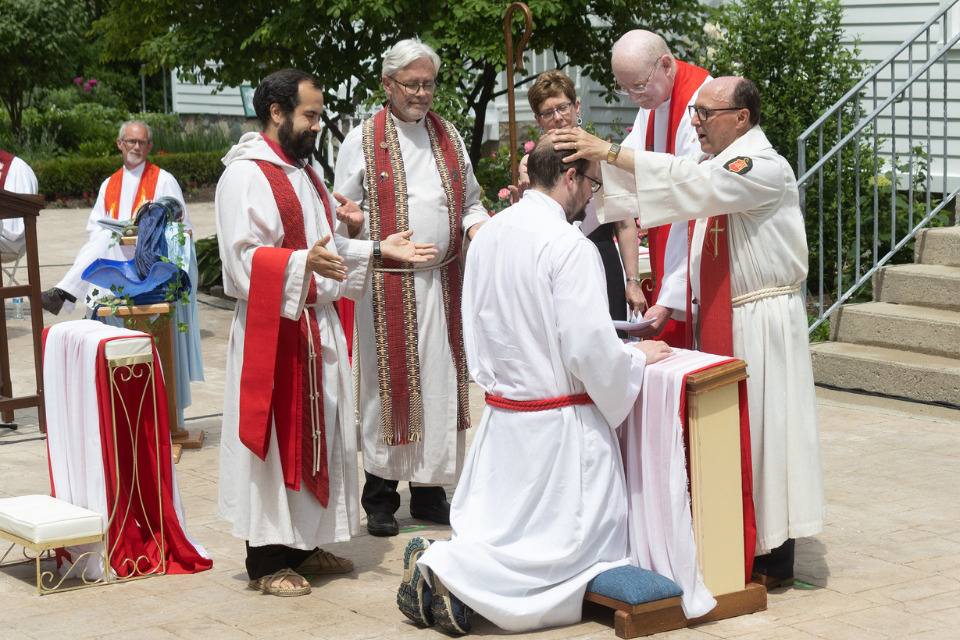
Another challenge we’ll continue to face is the calling of young people into ministry. The Lewis Center for Church Leadership out of Wesley Theological Seminary just released a study that said 2023 will be the lowest year ever as far as the number of young elders under the age of 35 in The United Methodist Church. So, I want to begin to have conversations about how we can look more broadly and offer a more robust benefits package. How can we add even more benefits potentially attracting younger clergy, primarily as conference leadership interacts with seminary students?
Two ideas immediately come to mind. Parental leave for clergy is outlined in the Discipline, but right now, it’s usually up to the local church to fund it. Sometimes, districts can help with this cost. It would be great if we could find a way to promise funding on a conference level for anyone to have parental leave. One other possible benefit is to help clergy who have heavy financial debt because of school loans. Is there a way that we can help relieve debt from a benefits perspective? Doing so may attract younger clergy, freeing them to feel like they could take whatever appointment the bishop has for them without being concerned about how they will make enough money to pay their debts or make ends meet.
You mention benefits for younger clergy, so discuss the conference’s continued support of retired clergy.
We do a really good job of caring for our retirees in their retirement years with health insurance and a very robust pension program. The worst thing is that it gets the most complicated when we’re older because suddenly, when you need to apply for Medicare, there are parts A, B, C, and D. It’s hard enough to understand how your benefits work when you have active health insurance through your employer. But now you’re over 60 and have to try to figure it all out. Basically, it’s healthcare in only the way a government could do it. And I always feel bad because those people should have it the easiest. After all, they are reaching a point in life where it becomes more challenging to understand how all these pieces work. So, how can we, as a conference, better assist those retirees going through this phase of life?
Through Wespath, we also offer a variety of benefits through their Comprehensive Protection Plan (CPP), such as long-term disability coverage and death benefits when a clergy person passes away, or a family member of a clergy person passes away. And these benefits aren’t just for retirees. So, I feel we take good care of our clergy and staff when bad things occur.
Tell us something about your hobbies or personal interests that might surprise us.
One thing that always surprises people is knowing that right out of high school, I moved to New York City from a small town in Minnesota because I thought I would be a professional actor. I quickly realized that even though I had these dreams of being a famous movie star, the reality is that 1% of the top 1% of people make it to that point. And I wasn’t interested in auditioning my entire life to get a few jobs here and there. And so I shifted my focus. People find that bit of background fascinating, and I think I also bring those gifts into ministry. I can be in front of people and present clearly, coherently, and concisely. All that ties back to my background in theater.
I love to make ice cream. That’s a hobby of mine. And that’s been an enjoyable HR piece for me, finding out when staff members’ birthdays are and making ice cream for them. Some of the flavors people like include salted caramel and coffee. And then I like to experiment. One of my personal favorites is lavender ice cream. Not everyone loves that flavor, but I really do.
Editor’s note: This interview was edited for length and clarity.
Last Updated on November 14, 2023

